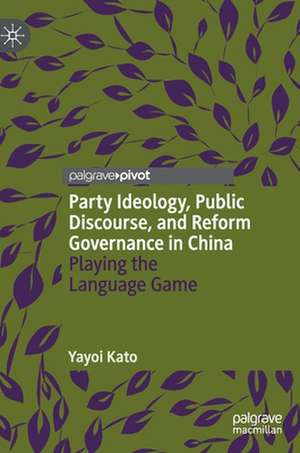Party Ideology, Public Discourse, and Reform Governance in China: Playing the Language Game: Politics and Development of Contemporary China
Autor Yayoi Katoen Limba Engleză Hardback – 24 feb 2021
Din seria Politics and Development of Contemporary China
-
 Preț: 384.86 lei
Preț: 384.86 lei - 15%
 Preț: 707.46 lei
Preț: 707.46 lei - 15%
 Preț: 645.79 lei
Preț: 645.79 lei - 15%
 Preț: 643.34 lei
Preț: 643.34 lei - 15%
 Preț: 583.28 lei
Preț: 583.28 lei - 15%
 Preț: 647.59 lei
Preț: 647.59 lei -
 Preț: 387.75 lei
Preț: 387.75 lei - 18%
 Preț: 890.06 lei
Preț: 890.06 lei - 15%
 Preț: 699.28 lei
Preț: 699.28 lei - 18%
 Preț: 785.55 lei
Preț: 785.55 lei - 18%
 Preț: 954.62 lei
Preț: 954.62 lei - 15%
 Preț: 474.50 lei
Preț: 474.50 lei -
 Preț: 382.18 lei
Preț: 382.18 lei - 15%
 Preț: 478.38 lei
Preț: 478.38 lei -
 Preț: 385.47 lei
Preț: 385.47 lei - 15%
 Preț: 585.26 lei
Preț: 585.26 lei - 18%
 Preț: 723.24 lei
Preț: 723.24 lei -
 Preț: 381.98 lei
Preț: 381.98 lei -
 Preț: 385.84 lei
Preț: 385.84 lei - 18%
 Preț: 729.36 lei
Preț: 729.36 lei -
 Preț: 353.18 lei
Preț: 353.18 lei -
 Preț: 350.12 lei
Preț: 350.12 lei -
 Preț: 388.72 lei
Preț: 388.72 lei -
 Preț: 389.70 lei
Preț: 389.70 lei -
 Preț: 388.72 lei
Preț: 388.72 lei -
 Preț: 392.60 lei
Preț: 392.60 lei - 18%
 Preț: 897.33 lei
Preț: 897.33 lei
Preț: 451.87 lei
Nou
Puncte Express: 678
Preț estimativ în valută:
86.46€ • 90.28$ • 71.40£
86.46€ • 90.28$ • 71.40£
Carte tipărită la comandă
Livrare economică 15-29 aprilie
Preluare comenzi: 021 569.72.76
Specificații
ISBN-13: 9783030667061
ISBN-10: 3030667065
Pagini: 153
Ilustrații: XI, 153 p. 2 illus., 1 illus. in color.
Dimensiuni: 148 x 210 mm
Greutate: 0.35 kg
Ediția:1st ed. 2021
Editura: Springer International Publishing
Colecția Palgrave Macmillan
Seria Politics and Development of Contemporary China
Locul publicării:Cham, Switzerland
ISBN-10: 3030667065
Pagini: 153
Ilustrații: XI, 153 p. 2 illus., 1 illus. in color.
Dimensiuni: 148 x 210 mm
Greutate: 0.35 kg
Ediția:1st ed. 2021
Editura: Springer International Publishing
Colecția Palgrave Macmillan
Seria Politics and Development of Contemporary China
Locul publicării:Cham, Switzerland
Cuprins
Introduction.- Chapter 1. Ideology: Definitions, Approaches, and Critique.- Chapter 2. Analyzing the Language Game: Conceptual Framework, Data, and Methods.- Chapter 3. SOE Reform Discourse under Jiang Zemin.- Chapter 4. SOE Reform Discourse under Xi Jinping.- Chapter 5. Two Faces of Ideology: Double-Edged Sword for Rulers.- Chapter 6. Ideology, Language, and Political Power: Implications for Xi Rule.- Conclusion.
Notă biografică
Yayoi Kato is Assistant Professor of Political Science at the Moravian College, Pennsylvania, USA, specializing in Chinese politics. Her research focuses on ideology and propaganda work of the Communist Party of China, political rhetoric, and discourse analysis of China’s reform policy debates.
Textul de pe ultima copertă
'This timely book offers valuable insights on key questions in Chinese governance, including the complex role of ideology in policy implementation, and the relationship between central decisionmakers and key state and non-state actors. Using case studies on state owned enterprise reform under Jiang Zemin and Xi Jinping, Kato's extensive research reveals how ideology can be used to mobilize consensus in support of reform initiatives or to obstruct such reforms by those with vested interests.'
- Stanley Rosen, Professor, Department of Political Science, University of Southern California, USA
- Stanley Rosen, Professor, Department of Political Science, University of Southern California, USA
Yayoi Kato is Assistant Professor of Political Science at the Moravian College, Pennsylvania, USA, specializing in Chinese politics. Her research focuses on ideology and propaganda work of the Communist Party of China, political rhetoric, and discourse analysis of China’s reform policy debates.
Caracteristici
Questions the normative assumption of ideology’s legitimating function shared by many propaganda scholars Argues that ideology can be a double-edged sword for political leaders Explores the relationship between ideology, language, reform governance, and political power in the Chinese context
